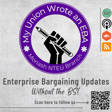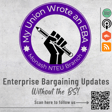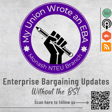
Episode 22: The University is on notice
In this episode, Kate & Tony round out the semester by updating everyone on a bunch of different things. Most important is the result of the all-members meeting where we voted unanimously to initiate increased industrial action at the beginning of semester one next year if the university fails to make meaningful concessions in bargaining. This officially puts the university on notice and starts the clock ticking. Either they get their act together or we take our biggest and most significant actions yet.
We also give a bargaining update, cover the branch's motion on the disaster unfolding in Gaza, and talk about why everyone should join the Industrial Action Working Group to help shape what actions we take in the future.
If you have questions you'd like answered, or any topics you would like to hear covered on the podcast, drop us an email at myunionwroteaneba@gmail.com
You can also stay up to date with everything happening with bargaining at our new bargaining website, and with the branch on Facebook and Twitter. All of which can be found here - https://linktr.ee/myunionwroteaneba


